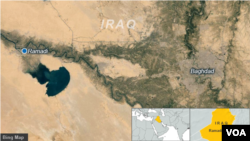Iraqi tribal militias backed by police special forces and helicopter gunships have launched an offensive to push al-Qaida-linked militants from Ramadi, the capital of western Anbar province.
Iraqi officials said ground forces retook a police station Sunday as they moved into key neighborhoods of the largely Sunni Arab city. They said the fighting was continuing late Sunday, but gave no further details.
A group called The Islamic State in Iraq and the Levant - an al-Qaida offshoot also fighting in Syria - and its local allies overran parts of Ramadi and the nearby city of Fallujah earlier this month.
Iraqi army units have deployed around Fallujah, but Prime Minister Nouri al-Maliki has ruled out an assault for now, saying the city's tribes must evict al-Qaida militants themselves.
Hours after the offensive on Ramadi was announced, Mr. Maliki blamed "diabolical" and "treacherous" Arab countries for supporting the unrest, and insisted he was "confident that the Iraqi people will defeat terrorism."
He did not single out specific countries, but Iraqi officials have alleged Saudi Arabia and Qatar in particular have supported disaffected Sunni Arabs in western Iraq as they have staged anti-government protests in the past year.
The militant takeovers in Ramadi and Fallujah came after security forces of Iraq's Shi'ite-led government broke up a Sunni protest camp and arrested an outspoken Sunni lawmaker.
Elsewhere Sunday, gunmen opened fire on a checkpoint run by a pro-government Sunni tribal militia outside the city of Baquba, killing the local leader and four assistants. The former al-Qaida stronghold is about 60 kilometers northeast of the capital, Baghdad.
Such Sunni "Awakening" militias were formed by U.S. forces during the height of Iraq's sectarian warfare. Al-Qaida-linked groups view them as traitors.
Sunday's fighting in Ramadi came as Jordan said it would host a U.S. training program for Iraqi forces following a request from Washington.
Two years after U.S. troops left Iraq, violence has soared to its highest levels since the Sunni-Shi'ite bloodletting of 2006-2007, when tens of thousands of people were killed.
The United Nations says nearly 9,000 people died violently in Iraq last year, all but 1,050 of them civilians.
Some information for this report was provided by AP and AFP.
Iraqi officials said ground forces retook a police station Sunday as they moved into key neighborhoods of the largely Sunni Arab city. They said the fighting was continuing late Sunday, but gave no further details.
A group called The Islamic State in Iraq and the Levant - an al-Qaida offshoot also fighting in Syria - and its local allies overran parts of Ramadi and the nearby city of Fallujah earlier this month.
Iraqi army units have deployed around Fallujah, but Prime Minister Nouri al-Maliki has ruled out an assault for now, saying the city's tribes must evict al-Qaida militants themselves.
Hours after the offensive on Ramadi was announced, Mr. Maliki blamed "diabolical" and "treacherous" Arab countries for supporting the unrest, and insisted he was "confident that the Iraqi people will defeat terrorism."
He did not single out specific countries, but Iraqi officials have alleged Saudi Arabia and Qatar in particular have supported disaffected Sunni Arabs in western Iraq as they have staged anti-government protests in the past year.
The militant takeovers in Ramadi and Fallujah came after security forces of Iraq's Shi'ite-led government broke up a Sunni protest camp and arrested an outspoken Sunni lawmaker.
Elsewhere Sunday, gunmen opened fire on a checkpoint run by a pro-government Sunni tribal militia outside the city of Baquba, killing the local leader and four assistants. The former al-Qaida stronghold is about 60 kilometers northeast of the capital, Baghdad.
Such Sunni "Awakening" militias were formed by U.S. forces during the height of Iraq's sectarian warfare. Al-Qaida-linked groups view them as traitors.
Sunday's fighting in Ramadi came as Jordan said it would host a U.S. training program for Iraqi forces following a request from Washington.
Two years after U.S. troops left Iraq, violence has soared to its highest levels since the Sunni-Shi'ite bloodletting of 2006-2007, when tens of thousands of people were killed.
The United Nations says nearly 9,000 people died violently in Iraq last year, all but 1,050 of them civilians.
Some information for this report was provided by AP and AFP.






